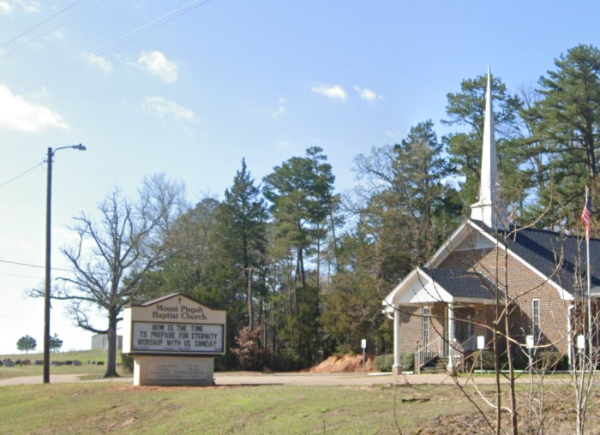
News Channel 3 reported the pastor of Mt. Pisgah Missionary Baptist Church located at 4995 FM 49, Mineola, TX 75773, was arrested on Tuesday on charges of indecency with a child by sexual contact, as per judicial records.
The arrest has sent shockwaves through the community, leaving many in disbelief as Timothy Nall, 68, was considered a trusted figure within the church. However, disturbing revelations have now come to light as the family of the alleged victim speaks out.
“We want justice for our family and for the previous victims that didn’t get justice,” the family of the alleged victim expressed, as they called for accountability in the wake of these deeply troubling allegations.
As the news unfolds, it has come to light that this is not the first time Nall has faced similar accusations. In 2014, he was indicted in Alcorn County, Mississippi, on charges stemming from a sexual battery case involving a minor. At that time, Nall served as the pastor of Farmington Baptist Church near Corinth, MS. The accusations claimed that he abused a child when they were just 6 and 7 years old.
However, the case back in 2014 resulted in a mistrial as two jurors could not reach a unanimous verdict, according to sources. Undeterred, prosecutors pursued justice and indicted Nall again, adding another count of fondling to the charges.
Now, with these new charges in Mineola, Texas, the pastor is facing serious legal consequences once again. Authorities are urging any other potential victims to come forward and assist with the ongoing investigation.
As the legal proceedings continue, Mt. Pisgah Missionary Baptist Church has not yet issued a public statement regarding Nall's arrest, leaving its congregation and the community in a state of bewilderment.

In the wake of shocking allegations surrounding the arrest of a pastor, questions arise about the accountability of those who enable abuse within religious institutions. To shed light on this important issue, we sat down with Anjali Nigam, Esq., an experienced sexual abuse attorney based in Texas. With his expertise in handling cases of sexual abuse and institutional negligence, Anjali provides valuable insights into the options survivors may have when filing clergy abuse lawsuits against those who failed to take appropriate action.
Editor Darla Medina (DM): Good evening, Anjali, thank you for joining us to shed light on this deeply concerning matter. Given your experience, what options do survivors of sexual abuse have when pursuing a civil case against those who enable abuse within a Baptist church?
Attorney Anjali Nigam (AN): Good evening, Darla. Thank you for having me. It's essential to understand that survivors of sexual abuse in Baptist churches or any religious institution have legal avenues to seek justice and accountability against those who enable such abuse.
DM: Can you explain how a civil case might be pursued in this specific context?
AN: Certainly, Darla. When survivors of sexual abuse wish to hold individuals or institutions accountable, a civil lawsuit can be filed. This type of lawsuit aims to seek compensation for the harm caused by the abuse and, importantly, hold those who enabled the abuse accountable.
DM: How could survivors pursue a civil case against those who enabled the abuse within the Baptist church?
AN: Survivors can seek legal action against not only the perpetrator but also the church or other individuals who may have enabled the abuse to occur. Enablers could include church officials, administrators, or anyone in a position of authority who failed to take appropriate action to protect the victims or covered up the abuse.
DM: What kind of evidence would be crucial in such civil cases?
AN: Gathering evidence is critical in any lawsuit. Survivors should preserve any documentation, such as emails, letters, or church records, that might indicate knowledge of the abuse and failure to act. Witness testimonies, including those from other survivors who experienced similar abuse, can also be significant in proving negligence or wrongful actions by the institution or individuals involved.
DM: Are there any specific laws or regulations that might be applicable in these cases?
AN: Yes, Darla. Each state has its own laws regarding the statute of limitations for filing civil cases related to sexual abuse. In Texas, the statute of limitations has been expanded in recent years to allow more time for survivors to come forward and seek justice. Additionally, there might be specific laws that govern the liability of religious institutions in enabling abuse, which is why it's crucial for survivors to consult with an experienced attorney who can navigate these complex legal aspects.
DM: Thank you for explaining these essential aspects, Anjali. For any survivors or individuals seeking legal guidance in cases of sexual abuse within religious institutions, what steps should they take?
AN: If anyone has experienced sexual abuse or has information about abuse within a religious organization, I urge them to reach out to a qualified and compassionate attorney. An experienced sexual abuse attorney can provide guidance, protect their rights, and support them through this challenging process.
DM: Thank you, Anjali, for your valuable insights and guidance on this sensitive topic. Our thoughts are with the survivors, their families, and the entire community affected by these disturbing allegations.
 info@legalherald.com
info@legalherald.com